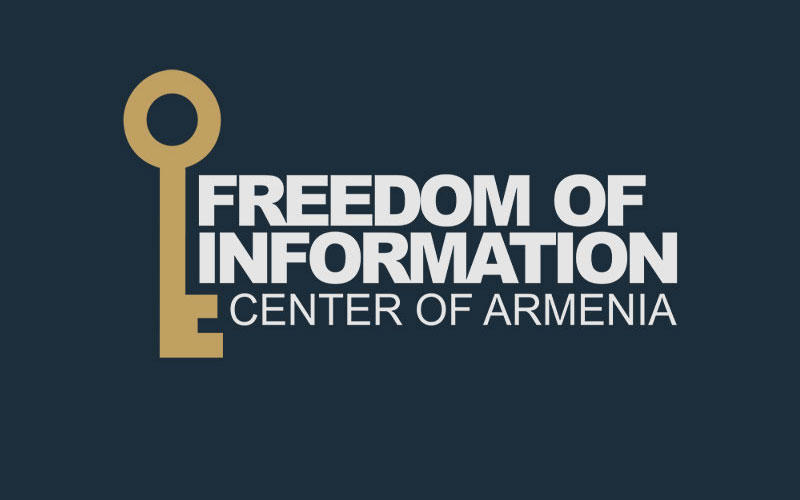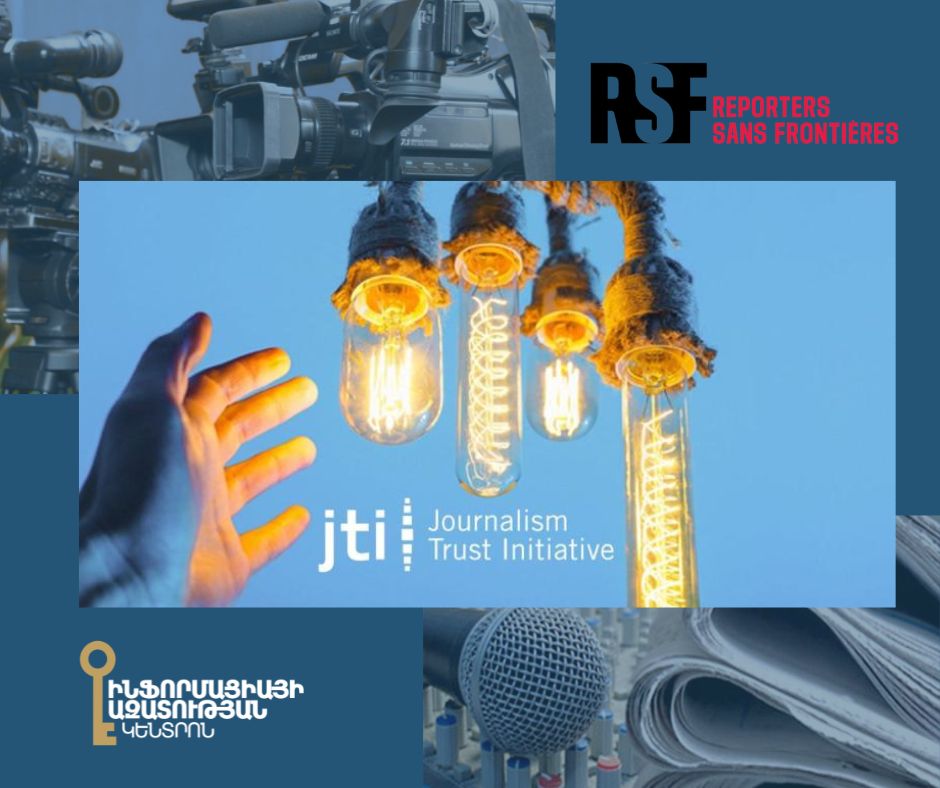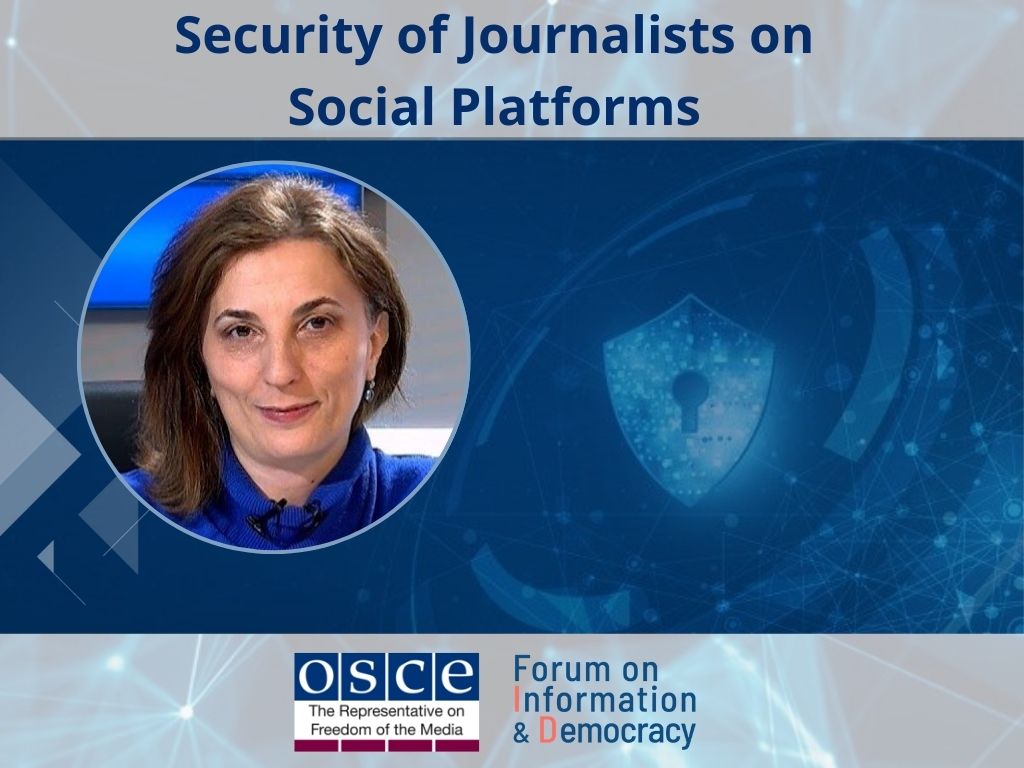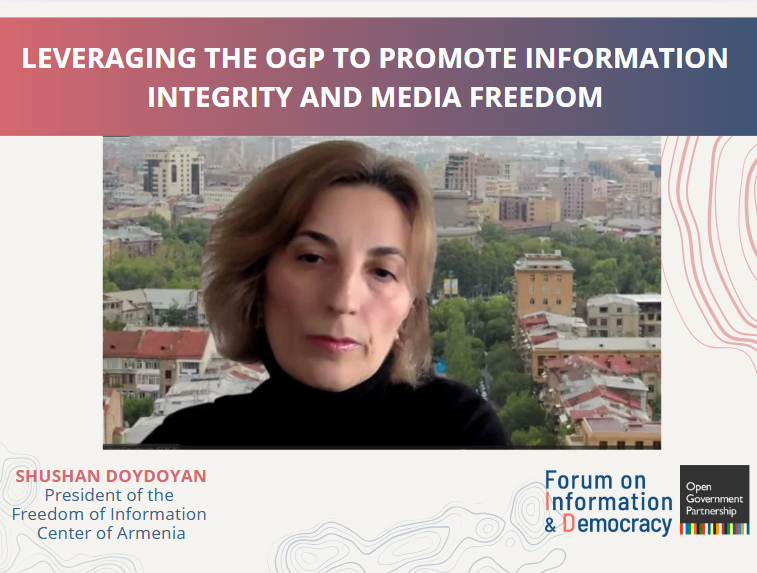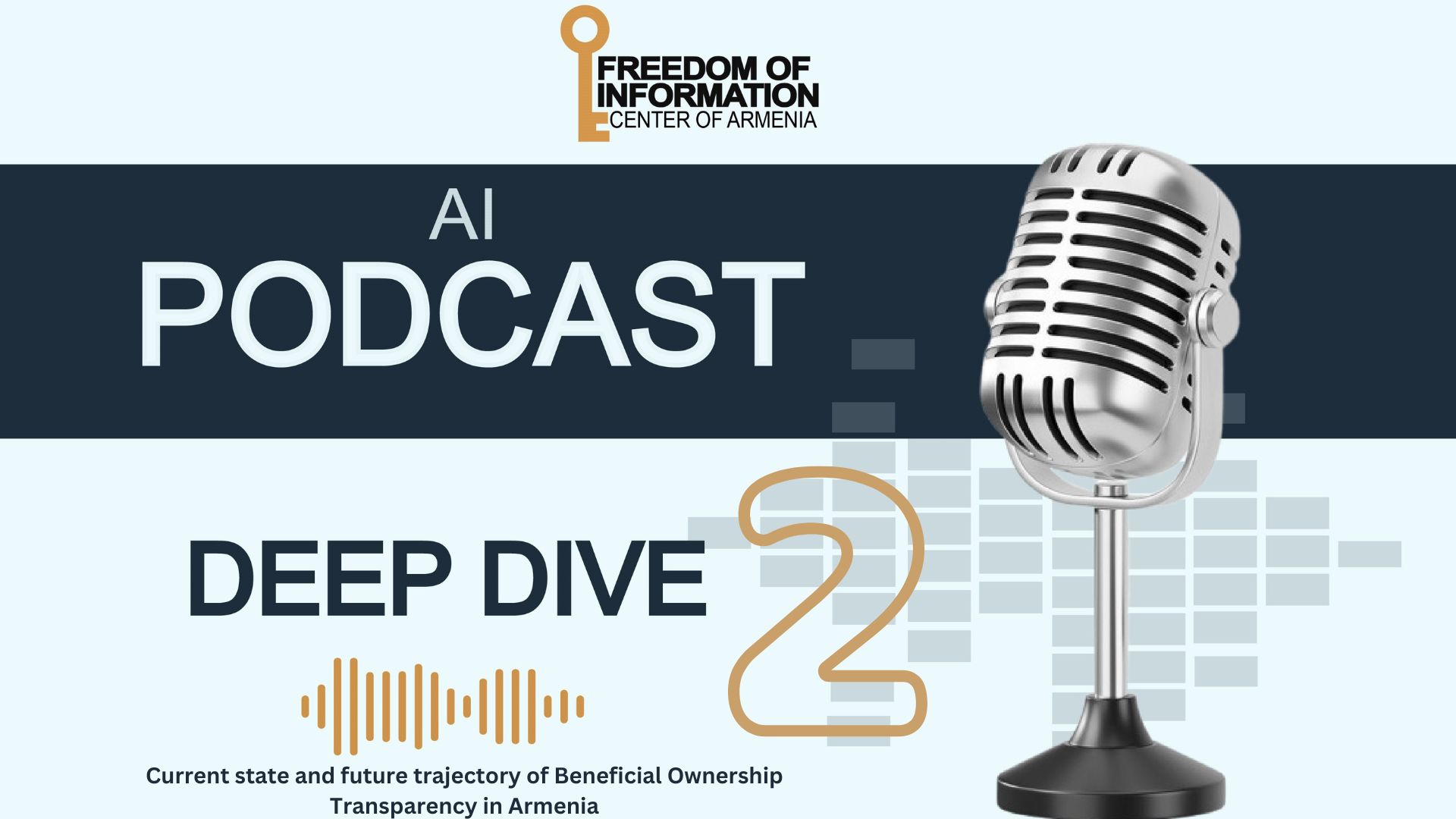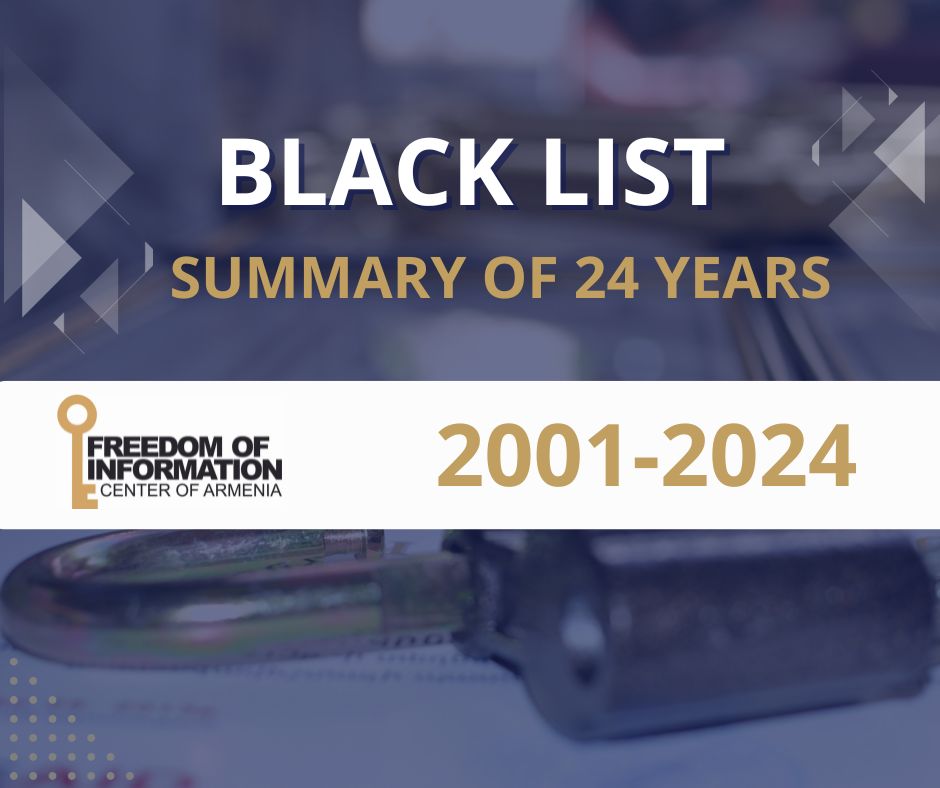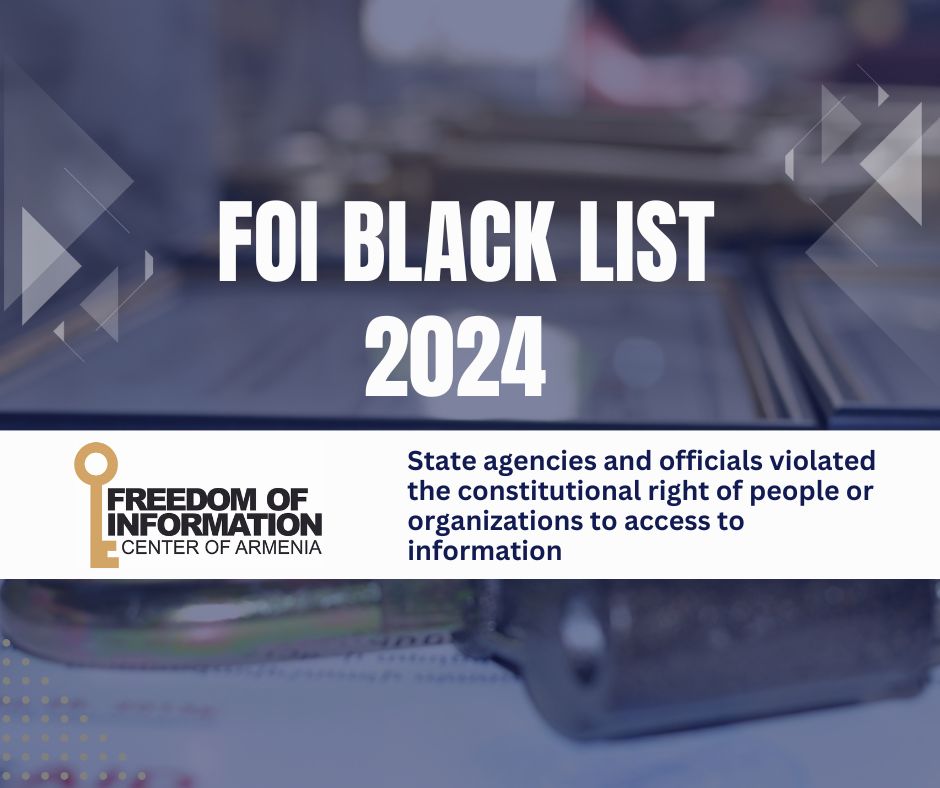The Freedom of Information Center of Armenia is accepting proposals from citizens and organizations in different categories of the FOI annual Award Ceremony.
- Positive award for the most transparent institution which fulfills the FOI law requirements,
- Award for NGO, which has contributed to the exercising of the rights of access to information,
- Award for the journalist most actively covering FOI issues,
- Award for the citizen most actively exercising his/her right to have access to government held information,
- The best official web site from the point of view of freedom of information.
- Negative award for an institution, which does not fulfill its obligations in under the FOI law,
- Negative award for an institution providing the most ridiculous official answer.
You can nominate your candidates by calling the following phone number: 560922, or by sending an e-mail to foi@foi.am.
Below are the criteria for accepting the candidates:
State body or local self-government body election criteria
A) Ensuring the freedom of information by proceeding with the enquiries.
– In that body does every person, without any discrimination, have access to the right of being informed?
– In that body are the written enquiries for information proceeded in the deadlines provided by the law (5 days and 30 days)? If the answer is being delayed is the enquirer informed about the times and reasons of the delay?
– Are the oral enquiries for information answered immediately or as soon as possible?
– When an enquiry for information is denied or if the body does not posses the information, does it inform the enquirer about the bases of the denial or about the body that does posses the information?
– Is the enquirer provided with reliable and complete information?
– When receiving enquiries for information is the enquirer required to clarify why he needs that information?
– Justifying denials. When denying an enquiry does that body justify the denial by referring in a written form to the statutory provision, according to which the enquiry for information is denied?
– Excluding any discrimination. In that body do different enquirers receive equal approaches (journalist, citizen, NGOs, etc.)? Are the representative of all the media outlets given equal conditions in that body for receiving information which promotes their work and is free of any discrimination. Is the information intended for the mass media given to all the journalists simultaneously, and are the journalists informed about the exact date and place of upcoming events within realistic times before the event.
– Supporting the enquirers. In that body do people with special needs (lack of literacy, disability, etc.) receive assistance for writing their enquiry for information.
– In that body is there a person responsible for the freedom of information.
– In that body is there a room intended for the citizen reception.
B) Ensuring the freedom of information by publishing the information with your own initiative.
– With its own initiative does the body take appropriate measures in order to publish the information it possesses, without any enquiry for information, especially the information that is defined by article 7 of the “Law about the Freedom of Information”?
– Have any guidelines been published as to how the citizens can study the “Law about the Freedom of Information”, and are those guidelines accessible.
– Is there a proper form available for enquiring for information, and does it include all the data defined by the “Law about the Freedom of Information”?
– Is the proper form for enquiring for information available on the website of the department?
– Are there any statistics of the enquiries received by the department (accounts), as is defined in the “Law about the Freedom of Information”?
– Is that information made really available to the public?
– Do the bodies periodically update the published information? Are the changes published within 10 days?
– Does the body immediately publish the information under its possession, the publishing of which can prevent dangers to the state and public security, to the public order, to the health and customs of the society, to others’ freedoms and rights, to the environment, to personal properties, etc?
C) Electronic Publications.
– Do the bodies publish the information in their websites, including the abovementioned information, in order to simplify the process of acquiring the information kept in state bodies?
– Are the bodies, which do not have a website, advised to create a website and make their information available online?
– Do the state bodies periodically update their website (changes are published within 10 days)?
– Do the bodies have a special employee, one of whose main duties is to update the official website?
– Are the e-mails sent to the e-mail address provided in the official website read on daily bases, and are all the electronic enquiries appropriately and timely proceeded?
– Other mechanisms of electronic FOI. Are the bodies encouraged to install the electronic system for proceeding with enquires and applications?
D) The Staff.
Do the employees in the departments of information and public affairs have the needed knowledge and skills in the sphere of the freedom of information? Do they master the technical/practical skills of managing the information?
Best Official Website for Providing Information
– Does the website of the state/local self-government body publish the information that according to the “Law about Freedom of Information” must be published?
– Is the contact information of the person responsible for providing information published (name, position, phone number, e-mail address)?
– Does the website have a subsection about Freedom of Information?
– Is there a proper form for information enquiries on the website of state/local self-government bodies?
– Whether it is possible to send an electronic enquiry for information. Does the body respond to electronic enquiries/is information provided electronically?
Journalist/Media Outlet that has Most Actively Covered the Issues of Freedom of Information
– Does that journalist/media outlet use the “Law about Freedom of Information” during its activities?
– Has the “Law about Freedom of Information” been used in order to uncover or confirm a fact?
– The impact that the publications of that journalist/media outlet have had.
The NGO that has Best Used the Right to be Informed
– Is the NGO consistent in seeking for information?
– During its activities has the NGO actively used the “Law about Freedom of Information”?
– What impact does the NGO have on public opinion?
– Has that NGO defended the interests of other citizens with the help of the “Law about Freedom of Information”?
– Has that NGO preached the “Law about Freedom of Information” among other individuals and organizations?
The Citizen who was the Best to Use the “Law about Freedom of Information”
– Is the citizen consistent in seeking for information?
– While seeking for information does the citizen actively use the “Law about Freedom of Information”?
Criteria for Negative Awards
The Worst State/Local Self-Government Body to Realize its Duties Defined by the RA “Law about Freedom of Information”
A state/local self-government body that has not realized its duties defined by the RA “Law about Freedom of Information”, as well as has violated citizens’ right to be informed.
State/Local Self-Government Body that is the Author of the most Hilarious Official Reply
The most hilarious and the most absurd official answer to an information enquiry.

